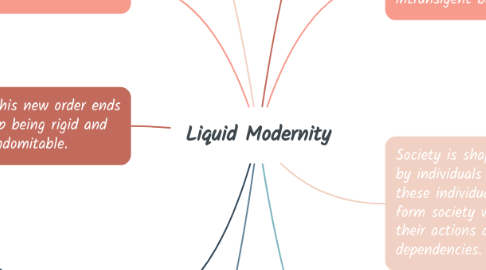
1. Modernity was said to be liberating and free, especilly in economy.
1.1. Emerged from the "melting" of the aspects in an established order suspected of limiting the individual freedom.
1.1.1. "Melting the solid" such as family in a business enter prise, and traiditional political, ethical and cultural entanglements in economy.
1.1.2. Causing the dissolution of the forces that could keep the question of order and system.
2. The economy as the "basis" of social life
2.1. Any non-economic action in that life was irrelevant, resulting in an economic order.
3. This new order ends up being rigid and indomitable.
3.1. The mold was replaced with another.
3.1.1. The CLASSES: people had to relocate themselves into this new order, which determined the range of realistic life projects and life strategies, the living conditions.
3.1.1.1. "Estates" were replaces by "classes".
3.1.1.2. The new freedom lead the individuals to follow, through conformity, the right rules and modes to locate in the classes.
4. Individuality instead of collectivity
4.1. Uses techniques that allow free agents to remain radically disengaged.
4.1.1. Led to social desintegration. Created "free individuals"
4.2. This was the product of "melting" an established order suspected to be limiting the individual freedom.
5. Panopticon respresents modern power
5.1. Here we find the MANAGER, who immobilize the SUBORDINATES in space, denying them the right to move and through the routinization of the time-rhythm they had to obey.
6. Liberation from a society without a "mass basis"
6.1. Feeling free, peolple feel satisfied with a minimum not even close to real freedom, but they don't feel the need to keep looking for it. To be objectively free recquires an act, and the determination to fight.
6.1.1. They do not know in which way they could liberate.
7. We are "reflexive-beings" and "critically predisposed", bold and intransigent but impotent.
7.1. There´s no more leaders controlling every action, but just individuals.
7.2. Their critique won't go further, and people may just keep going without looking back to what disturb them.
8. Society is shaped by individuals and these individuals form society with their actions and dependencies.
8.1. "Society" is a network of mutual renegotiation, the product of daily activities of the individuals.
8.1.1. Modern living is "needing to become what one is", so people live trying to take part in the social types and models of conduct.
8.2. "Individualization" consists of transforming "identity" into a "task" and making the actors responsible for the performance and the consequences.
8.2.1. Appears the need of "networking", need of collectivity, making a "community" by sharing individuals' worries and anxieties, which remains in just a momentary gathering.
9. The wide gap between individuals "de jure" and actual individuals.
9.1. The first kind of individuals chase the chance to become actual individuals, in order to have control over themselves, their choices and future.
9.1.1. Individuals are expropiated of their citizen skills and interest. A "de jure" individual needs to first become a citizen to become an individual "de facto".
